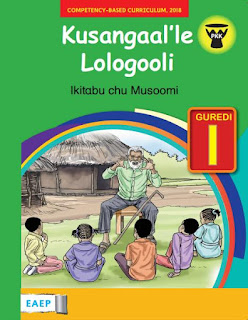Appropriate grammar defeats slang
Not ekedelu*?
The other reason why we should not tolerate 'l' and it's shortened form is because appropriate grammar defeats slang.
E.g
vuraru cannot be vul'lu (the slang of vururu) simply because we shorten successive r syllables and maintain the last vowel.
Virira can be slanged as vil'la but conflict with the slang of virara (which is vil'la).
If you write r, you won't ever question your grammar. It agrees by itself and passes the taste.
- when is Ngugi wa Thiong'o launching the _kusangaal'le lologooli_ books?
I will write a short article to prove that the title needs a relook.
Kusangaal'le is from the word sangara. Our dialect would see you speak sound " _sangaara_ "
Sangara if coughed, goes thus
Do - sangara
Repetition - sangarira
Be done for - sangarwa
Be made to - sangarizwa
Assume the - sangarika
Instead of/monotony - sangaririra
Verb to noun - vusangaru
Etc as how best we should nyambua.
I have shared prior on the hardship there is if we increase the count of vowels in words. It is dialect that we are transporting to books. It should not be so.
Consider
Ndarora mama nasangaririraa emeseji ya baba yari namutumiyi mu isimu. (We did not lengthen maama, emeeseji, baaba, yaari, naamutumiyi, isiimu)
Or
Kusangara nu kuva nu vuyanzi. (We did not lengthen vuyaanzi. Had you noticed?)
Unfortunate to us we take the word from the lips to the book. If Americans were to write English we would have Thar instead of that, meen instead of men. Kind of.
In brief, Kusangaririri should have taken a best position. It is an act of praise, love etc. Making the verb liven. Which kunyambua would it be? Then children can be taught it can be slanged as 'kusangaril'li'. 😊.
As for Lulogooli, I think we closed the debate. Maragori is the language. I speak maragori language. Not I speak lulogooli.
Lulogooli is saying luluhya or luswahili or lwidakho. 😊. It chance some sense of thingneess. Lukisii. I blame none of the forefathers. They did their part.
-Can we do our part?
The other reason why we should not tolerate 'l' and it's shortened form is because appropriate grammar defeats slang.
E.g
vuraru cannot be vul'lu (the slang of vururu) simply because we shorten successive r syllables and maintain the last vowel.
Virira can be slanged as vil'la but conflict with the slang of virara (which is vil'la).
If you write r, you won't ever question your grammar. It agrees by itself and passes the taste.
- when is Ngugi wa Thiong'o launching the _kusangaal'le lologooli_ books?
I will write a short article to prove that the title needs a relook.
Kusangaal'le is from the word sangara. Our dialect would see you speak sound " _sangaara_ "
Sangara if coughed, goes thus
Do - sangara
Repetition - sangarira
Be done for - sangarwa
Be made to - sangarizwa
Assume the - sangarika
Instead of/monotony - sangaririra
Verb to noun - vusangaru
Etc as how best we should nyambua.
I have shared prior on the hardship there is if we increase the count of vowels in words. It is dialect that we are transporting to books. It should not be so.
Consider
Ndarora mama nasangaririraa emeseji ya baba yari namutumiyi mu isimu. (We did not lengthen maama, emeeseji, baaba, yaari, naamutumiyi, isiimu)
Or
Kusangara nu kuva nu vuyanzi. (We did not lengthen vuyaanzi. Had you noticed?)
Unfortunate to us we take the word from the lips to the book. If Americans were to write English we would have Thar instead of that, meen instead of men. Kind of.
In brief, Kusangaririri should have taken a best position. It is an act of praise, love etc. Making the verb liven. Which kunyambua would it be? Then children can be taught it can be slanged as 'kusangaril'li'. 😊.
As for Lulogooli, I think we closed the debate. Maragori is the language. I speak maragori language. Not I speak lulogooli.
Lulogooli is saying luluhya or luswahili or lwidakho. 😊. It chance some sense of thingneess. Lukisii. I blame none of the forefathers. They did their part.
-Can we do our part?

Comments
Post a Comment